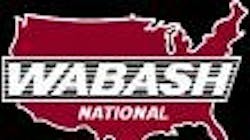Wabash Implements Cost-Reduction Actions
Wabash National Corporation today announced it has implemented additional actions that will substantially decrease its corporate overhead and operating costs in light of continued macroeconomic and industry-related headwinds, generating annualized net cash savings of approximately $20 million.
The moves came as Wabash said that new trailer-unit shipments for the fourth quarter and full year 2008 are expected to be 9,300 and 33,300 units, respectively.
Wabash National Corporation today announced it has implemented additional actions that will substantially decrease its corporate overhead and operating costs in light of continued macroeconomic and industry-related headwinds, generating annualized net cash savings of approximately $20 million.
The moves came as Wabash said that new trailer-unit shipments for the fourth quarter and full year 2008 are expected to be 9,300 and 33,300 units, respectively.
The following actions were taken:
- Further salaried workforce headcount reductions of 25 associates, or 5%, bringing total salaried headcount reductions to over 25%, or approximately 170 associates, since the beginning of the industry downturn in early 2007.
- A 10% reduction in base salary for executive officers and the senior management team.
- A temporary reduction of 10% of annualized base salary for all remaining exempt-level salaried associates, combined with a reduction in the standard work week for most from 40 hours to 36 hours.
- A temporary reduction in the standard paid work week from 40 hours to 36 hours for all non-exempt associates.
- Introduction of a Voluntary Unpaid Layoff Program with continuation of benefits.
- Continued close regulation of the work-day and headcount of hourly associates.
These actions are expected to be substantially complete and in effect by February 1, and are incremental to previous actions taken during this downturn. Previous actions included idling of plants and assembly lines, Lafayette consolidation and transformation initiatives, salaried workforce reductions, reductions in total compensation awards to executives and other eligible participants, a temporary reduction of 401K company match, the suspension of any company match for non-qualified plan participants, as well as the recently announced suspension of dividend distributions.
“Fourth-quarter and full-year 2008 new trailer-unit shipments will exceed the high end of our estimates of 9,000 and 33,000 units, respectively, gaining significant market share within our dry van business,” said Dick Giromini, President and Chief Executive Officer. “However, our consolidated unit shipments have fallen dramatically from 59,400 in 2006, the peak year of this past cycle. Since that time we have taken numerous, proactive steps towards realigning our cost structure with current and expected demand levels. The most recent actions dovetail with our previous cost-optimization initiatives implemented during the past two years. While these are difficult decisions to make, we continue to operate in a challenging market environment and believe it is prudent to optimize our cost structure and maximize our cash flow.”
In addition to the aforementioned cost-reduction actions, the company announced today that it anticipates recording two non-cash charges during the fourth quarter of 2008. After reviewing goodwill for impairment during the fourth quarter, the company determined that its goodwill, primarily related to its acquisition of Transcraft but including all goodwill in its manufacturing segment, was impaired. Accordingly, the company anticipates recording a non-cash goodwill impairment charge of up to approximately $66 million in its fourth-quarter results. The determination that goodwill was impaired was made after considering the current macroeconomic environment, the depressed market price of the company’s common stock, and the present value of expected future cash flows.
The company also anticipates reporting an additional charge to income tax expense for the fourth quarter of approximately $23 million related to establishing a full valuation allowance on its net deferred tax assets. The company considered all available evidence, both positive and negative and concluded that it was no longer more likely than not that it would realize the full value of its net deferred tax assets.
Bob Smith, Senior Vice President and Chief Financial Officer, commented, “While these charges are prudent and necessary to take in light of the current environment, they are non-cash in nature and do not have any impact on our future operations, liquidity, cash flow or borrowing base.”
